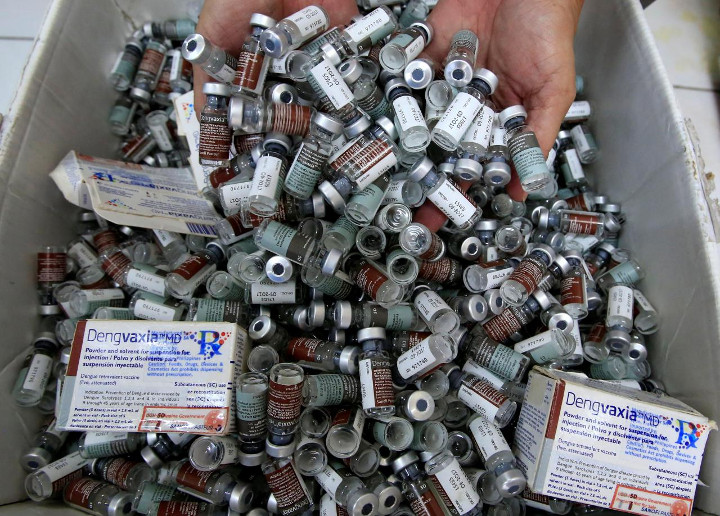Here’s What You Should Know About the Vaccine Dengvaxia
Dec 6, 2017 • Kyzia Maramara

Dec 6, 2017 • Kyzia Maramara
Over the past few days Dengvaxia has been the talk of the town and everybody is thrown into a panic after the manufacturer issued a warning against its own drug. If you know people who received the drug and is now fearing that it might have adverse effects on them, knowing a little more about the vaccine might help calm things down. Don’t panic yet! Here’s everything you need to know to keep you up to speed about Dengvaxia.
Dengue is the fastest-spreading mosquito-borne tropical disease that kills thousands of people a year and infects hundreds of millions. A bite from a mosquito with the virus could result in fever, headaches, rashes, and joint pain among others. If the dengue is severe, it could cause hemorrhaging and ultimately even death.
In the Philippines about a 200,000 cases of dengue are reported every year and about a thousand perish from it. In a surveillance report made by the Department of Health, as of September 2017, 526 have died to dengue but the numbers have been better considering that 764 died the previous year.
Dengvaxia is a drug developed by French drug maker Sanofi Pasteur and is the first dengue vaccine to ever be licensed. It is aimed at people aged 9-45 and in some countries 9-60. Sanofi has spent over 20 years developing this vaccine which is now being sold to countries like Brazil, Singapore, Mexico, Indonesia, Thailand, Paraguay, Peru, Costa Rica, El Salvador and Guatemala.
Last Monday (December 4), the Food and Drug Administration has suspended the sales and distribution of Dengvaxia issued by Sanofi Pasteur. This was after Sanofi announced that the vaccine could actually worsen the disease for people who’ve never had dengue prior to vaccination. The FDA also told Sanofi to mount an information campaign through advisories, letters to doctors, and discussions with patients.
The Department of Health has already allotted 3.5-billion pesos for 3 million doses of the vaccine and has already administered it to 733,000 children aged 9 and above. All who avail of the vaccine should receive three doses of Dengvaxia within a span of 6 months. Most of the children in the country has had two vaccines before it’s suspension on December 4.
Dr. Ng Su Peing, global medical head of Sanofi, said that those people who have not had dengue prior to receiving the vaccine could be susceptible to contracting severe dengue. “Severe dengue” does not mean fatal that could lead to death, it meant that the patient will have fever, low platelet count, and bruising. There will just be a higher chance of hospitalization for those who will be infected with dengue virus for the first time since getting vaccinated with Dengvaxia.
There had been reports of three children from Bataan who died allegedly because of the vaccine they were injected with in April 2016. But according to Dr. Ruby Dizon, Sanofi Pasteur Philippines Medical Director, the report was a case of misinformation and that an independent expert committee convened by the Department of Health has assessed the deaths as not related to the vaccine.
Ching Santos, Sanofi Pasteur general manager, has also said on Monday that no deaths were caused by the vaccine. All the study participants who had severe dengue have fully recovered and potential cases of severe dengue would not be fatal.
Aside from suspending the distribution of Dengvaxia, the Department of Justice has said that the National Bureau of Investigation will be investigating the vaccination program with regards to public health safety. It warned that there could be charges depending on the result. The Department of Health is also currently reviewing its contract with Sanofi Pasteur.
Our government is acting upon the situation as quickly as they can for public health safety.
If you have a relative that has been administered Dengvaxia and they begin to get ill and you suspect it’s because of the vaccine, report the case immediately. Sanofi has already assured the public that their vaccine will not lead to deaths, the worst case scenario is that it would lead to severe illness. They are also seeking to have a dialogue with the Philippine Food and Drug Administration (FDA) for the next steps to take.
Taking precautions and extra measures could go a long way. Since mosquitos are everywhere and you wouldn’t be aware all the time of them biting you, wear clothing that will cover most of your skin. If it’s too warm for long clothing, apply mosquito patches from drug stores and convenience stores or insect repellant lotion. In houses make sure that there is no stagnant water left anywhere that mosquitos could breed in. Buy a bug spray and spray in your house while children are off in school.
Got anything else to add? Share it with us in the comments!
Kyzia spends most of her time capturing the world around her through photos, paragraphs, and playlists. She is constantly on the hunt for the perfect chocolate chip cookie, and a great paperback thriller to pair with it.
Input your search keywords and press Enter.

2 comments